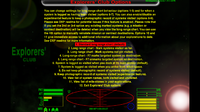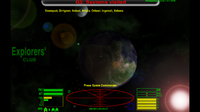Difference between revisions of "Explorers' Club OXP"
Capt. Murphy (talk | contribs) (→Overview) |
Capt. Murphy (talk | contribs) |
||
| Line 4: | Line 4: | ||
|version = 1.3.3 | |version = 1.3.3 | ||
|release = 30/06/2012 | |release = 30/06/2012 | ||
| − | |license = CC BY-NC-SA 3.0 | + | |license = [http://creativecommons.org/licenses/by-nc-sa/3.0/ CC BY-NC-SA 3.0] |
|features = New Activities | |features = New Activities | ||
|category = Activities OXP | |category = Activities OXP | ||
Revision as of 06:49, 30 June 2012
| Version | Released | License | Features | Category | Author(s) | Feedback |
|---|---|---|---|---|---|---|
| 1.3.3 | 30/06/2012 | CC BY-NC-SA 3.0 | New Activities | Activities OXP | Capt. Murphy | Oolite BB. |
Download original standalone version 1.3.3 from the box.
Download alternate version 1.3.3.oxpC that uses OXPConfig to change options in game from the box.
Overview
Explorers’ Club OXP v1.3.3 (30/06/12)
Inspired by Wildeblood, code by Capt Murphy - 2011,2012
Requires Oolite 1.76.1
Description
Once installed this OXP keeps track of unique systems visited and reports on the manifest screen (F5) the total systems visited in the current galaxy out of 256 and the total systems visited out of 2048 in the whole Ooniverse. It also displays an Explorer ‘rank’. You need to visit all 2048 systems to be ranked an Elite Explorer.
In addition this OXP adds some functionality to the Long Range Chart (F6/F6) in that it can be set to different modes. To access the options screen press F2, then F6 when docked. (These options are accessed via oxpConfig for version 1.3.3.oxpC - more info in readme included with download). The available options are:
- 1) Default - standard long range chart behaviour.
- 2) Long range chart shows animation of systems visited to date, in order of first visit.
- 3) Long range chart marks unvisited systems.
- 4) Player can manually mark systems on long range chart as a destination (highlight a system with the cursor and press F7).
- 5) Player can manually unmark systems on long range chart as a destination (highlight a system with the cursor and press F7).
Players should exercise caution when using the 2nd and 3rd options as it will clear any currently marked systems (e.g mission or contract destinations), although the 4th option can be used to manually reinstate them.
The options screen also allows you to choose when a system is recorded as visited. The options are.
- 1) Default – when docked at the main station.
- 2) On arrival from witch-space.
Options are persistent between sessions with the same save game.
The options screen also gives access to two further sets of mission screens.
- 1) Displays a list of the system names that have been visited so far in the current Galaxy, followed by a list of the system names that are yet to be visited in the current galaxy.
- 2) Displays a list of mile-stones that the player has completed / not completed so far. Defined mile-stones are:
- Visited all of the ‘Old Worlds’ in galaxy 1.
- Visited all of the ‘Famous Planets’ in galaxy 1 (as per OXP of same name).
- Visited all of the ‘Famous Planets’ in galaxy 2 (as per OXP of same name).
- Visited the ‘Prodigal Suns’ in galaxy 3.
- Visited the ‘Lost Worlds’ in galaxy 6.
- Visited the systems beyond the ‘Great Rift’ in galaxy 7.
- Visited Oresrati in galaxy 8.
- Visited all 8 galaxies at least once.
The options screen also allows you to enable/disable an experimental feature to keep a photographic record of systems visited. This is disabled by default.
If enabled the behaviour will depend on which option is set for recording a visit. If a visit is recorded on arrival from witch-space a screenshot will be automatically saved on exiting witch-space. If a visit is recorded on docking with the main station, at the next launch the player will be briefly ‘teleported’ to a good vantage point and a screenshot will be automatically saved before the player is teleported back to the launch point.
Related OXPs
In order to visit all 2048 systems and attain the rank of Elite Explorer players may find Wildeblood's Galactic_Hyperdrive_OXP a useful tool.




